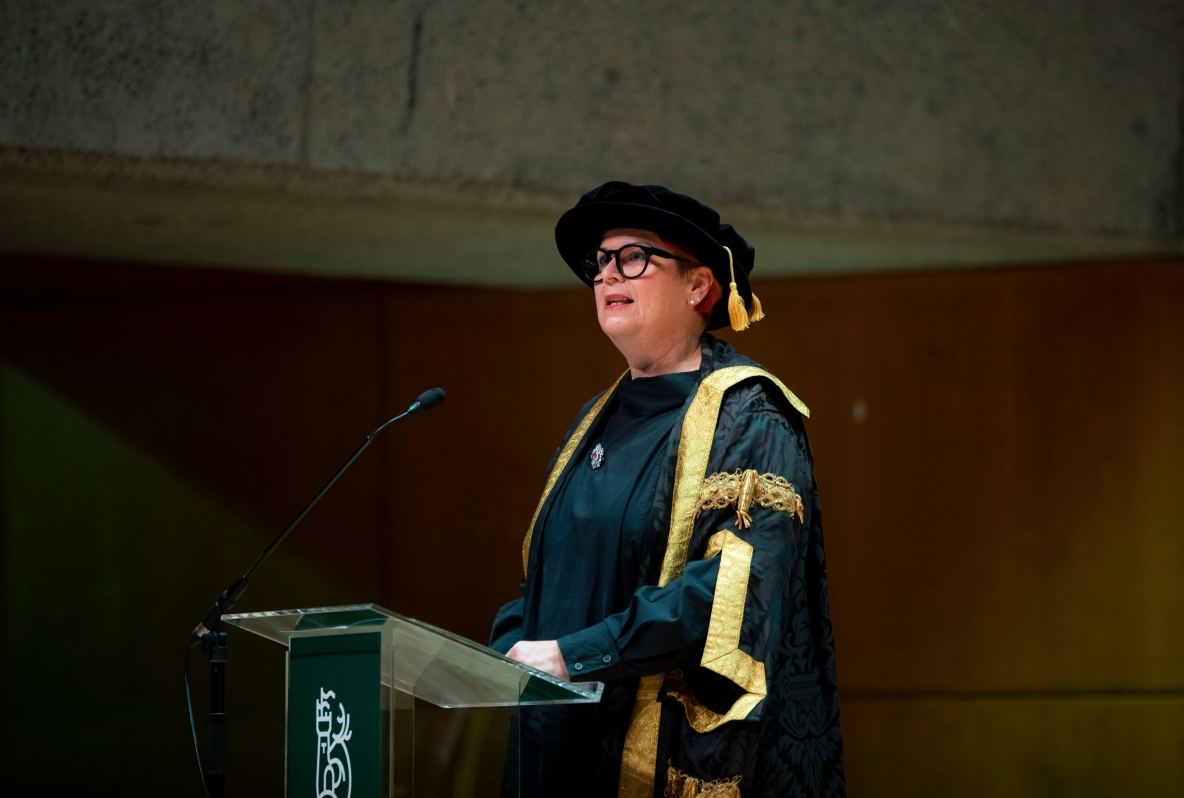
University of Limerick President Professor Kerstin Mey has delivered an inspiring and thought provoking inaugural lecture to an audience of invited guests, staff, and friends.
The Inaugural Address of Ireland’s first female university President took place this Wednesday in the University Concert Hall.
Over the past 30 years, Professor Mey has built a record of accomplishment of successfully initiating and implementing pioneering academic and research initiatives and cultural projects in higher education and her inaugural address was entitled ‘Back to practical utopias’.
The choice of title for the lecture was inspired by Margaret Atwood’s contribution to Greta Thunberg’s recently published Climate Book, and titled ‘Practical Utopias’, and the speech had a focus on climate and sustainability.
Members of governing authority, staff, invited guests and Professor Mey’s family and friends – some watching the livestream online – heard Professor Mey discuss “tasks ahead of us in UL to implement our ambitious Sustainability Framework 2030 to make our contribution to halt the ‘lethal models of living’ as Atwood calls them”.
“I hold the belief that the current global state of existential crises demands bold visions for the formation of a shared purpose for the global community, for Ireland, for this University. The clock is ticking! We have to galvanise intellect and passion, ideas and hope, character and agency to avert a global catastrophe. Anything less will not suffice,” said Professor Mey.
Born and raised in Berlin, Germany, Professor Mey studied for an MA equivalent in Art, and German language and literature at Humboldt University in Berlin and completed a PhD in Art Theory and Aesthetics there.
In the speech, Professor Mey discussed growing up in East Berlin and her journey through international academia, which includes various academic positions in universities in Germany and the UK (in Britain, Scotland and Northern Ireland, five institutions in total) before she joined University of Limerick as Vice President Academic Affairs and Student Engagement and Professor of Visual Culture in April 2018.
Prior to that, she worked at the University of Westminster where she held the position of Pro-Vice Chancellor and Dean of the Westminster School of Media, Arts and Design, and Professor of Contemporary Art and Theory.
Professor Mey is currently a member of the Board of the National Forum for the Enhancement of Teaching and Learning and the IUA Steering Group for Campus Engage, as well as serving on the Board of directors of several Irish cultural organisations including EVA, the Irish Aerial Creation Centre, Limerick Print Makers, the Irish Chamber Orchestra, and the Hunt Museum.
Her own research is concerned with practices of meaning making in contemporary and c. 20th art and culture. Her inquiries are concerned with art as research, with the relationship between cultural practices and identity formation, with the relationship between art making, documentation and archives, and with the exploration of cross-disciplinary connectivities.
She was the first ever woman president of an Irish university and in fact was – for a few days at least – the first East German woman president of a university, before the Brandenburgische Technische Universität (BTU) Cottbus-Senftenberg elected a female President in Gesine Grande.
Examining the question of “what universities are for”- Professor Mey said: “The move of the university into Limerick’s city centre opens up new engagement opportunities with a diversity of existing and emerging partners.
“Complementing existing and augmenting new engaged learning and research initiatives, it has the potential to bring our creative expertise to the city through the integration of multi-purpose, versatile and digitally enabled physical infrastructure that accommodates a wide range of cultural activities and formats and stimulates the dialogue and knowledge making between the art, technology and science.
“Extending the space of the university into the public realm, such a venue will stimulate exchange, making, experimenting through creative practices underpinned by our continued commitment to social justice, which has been central to the University’s identity from the start. A creative makers hub addresses the proven need for an arts-based and creativity-centred approach to the revitalisation of Limerick.
“In putting forward this vision, I bring to bear my experience and leadership roles in arts-led regeneration projects in Dundee, Belfast, and London, where universities with their art schools at the centre, promoted the longer-term dynamic effects of culture – such as the creation of a favourable milieu that attracts people, companies, and investments and that enhance the confidence, identity and well-being of their communities.
“These effects are more important than their economic impact and mark an important dimension of the purpose of universities.”